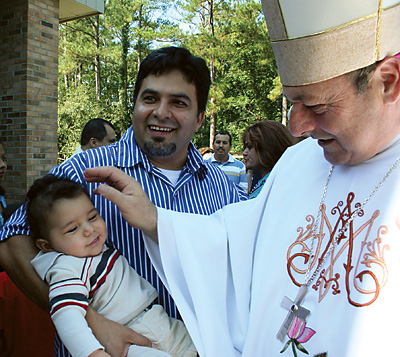
 COLUMBIA — We are called to be coworkers with Christ.
COLUMBIA — We are called to be coworkers with Christ.
That was Bishop Robert E. Guglielmone’s main message at the annual Diocese of Charleston Hispanic Festival held at Our Lady of the Hills Church on Oct. 3.
The festival theme was the Year for Priests and it celebrated the importance of the Eucharist, and the transforming message of Christ’s incarnation.
Bishop Guglielmone celebrated the Mass. He used an interpreter to tell the crowd that he was not yet fluent enough to celebrate a liturgy in Spanish, but his goal was to be able to do so by the Feast of Our Lady of Guadalupe on Dec. 12.
The bishop’s homily included a story about a summer he spent at a Boy Scout camp in New Mexico. He described how flocks of hummingbirds would visit the porch of a home where he stayed with another Catholic priest and a seminarian who also helped minister to the Scouts. They set out special hummingbird feeders, and dozens of the birds would fight viciously with each other as if they felt the food would be taken away.
“If only we could have convinced these birds we would care for them,” he said. “Isn’t that what God does for us? He gives us this tremendous gift of grace and human beings keep fighting among themselves. People don’t realize that God’s grace is enough for everyone … so God sent the greatest gift he could possibly give, his son Jesus.”
He urged participants to reflect on Jesus’ role as a high priest for all people, offering himself so they could achieve eternal life and realize the overwhelming power of God’s love for them.
The bishop said Catholics should pattern their lives after Jesus’ example, and pray to discern how they are being called to serve God and promote the Gospel message in the world.
“There are so many different ways to serve the Lord, and they all involve a willingness to give of oneself,” he said. “All of us are nourished by the very gift of Jesus Christ himself through the Eucharist we celebrate at the altar. God calls some of us to make that Eucharist present to others through the priesthood. No priest, no Eucharist.”
Bishop Guglielmone said others are called to make Christ’s presence known through the religious life, the permanent diaconate, as Christian husbands and wives or as single people devoted to serving God.
“Just as I was called to be your bishop, so too are you called to be coworkers with Jesus, the high priest,” he said.
He reminded people that South Carolina has a growing Catholic population, but a shortage of priests, deacons, and men and women religious.
He said that the growing Hispanic population especially needs an increase in religious vocations to reflect their cultures, and to serve as role models for young people.
Rhina Medina, the diocesan associate for Hispanic youth ministry, was encouraged by the bishop’s homily.
“I really liked the way the bishop talked about Christ’s invitation to consider vocations,” she said. “He really talked to the young people and asked them to consider if they were being called. It makes me want to start promoting vocations in working with the youth.”
Hispanic youth played an important part in the event. They led the procession, carried flags from all the nations represented, served as lectors and gift bearers in the Mass, and helped out during the afternoon celebration.
Organizers estimated between 600 and 700 people from around the state attended the daylong celebration.
The featured entertainers for the afternoon were the Mejia family of Mexico, comprised of a mother, father and their two sons, who performed for nearly two hours. They were in the Upstate for several weeks prior to the festival offering retreats and concerts.
The family sang and talked to the crowd about the priesthood, devotion to Mary, and the importance of family in Hispanic culture. Many people in the crowd danced and sang along with them.
Jennifer Feliciano, originally from the Dominican Republic, attended the festival with her parents and her nine-year-old son. Her husband and two other children could not attend, but she said the family has come to the celebrations together for several years. She was pleased to hear the Mejias and their music.
“They had a great message about keeping the family together through faith,” she said. “They told us how important it is to communicate, to problem-solve together, and to do things together as a family. This year’s celebration was one of the best because everyone got something out of it.”
